Related Research Articles
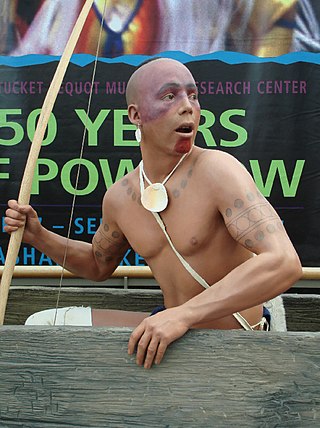
The Pequot are a Native American people of Connecticut. The modern Pequot are members of the federally recognized Mashantucket Pequot Tribe, four other state-recognized groups in Connecticut including the Eastern Pequot Tribal Nation, or the Brothertown Indians of Wisconsin. They historically spoke Pequot, a dialect of the Mohegan-Pequot language, which became extinct by the early 20th century. Some tribal members are undertaking revival efforts.


Mystic is a village and census-designated place (CDP) in Groton and Stonington, Connecticut.

North Stonington is a town in New London County, Connecticut which was split off from Stonington in 1724. The town is part of the Southeastern Connecticut Planning Region. The population was 5,149 at the 2020 census.

King Philip's War was an armed conflict in 1675–1676 between a group of indigenous peoples of the Northeastern Woodlands and the English New England Colonies and their indigenous allies. The war is named for Metacomet, the Pokanoket chief and sachem of the Wampanoag who adopted the English name Philip because of the friendly relations between his father Massasoit and the Plymouth Colony. The war continued in the most northern reaches of New England until the signing of the Treaty of Casco Bay on April 12, 1678.

The Pequot War was an armed conflict that took place in 1636 and ended in 1638 in New England, between the Pequot tribe and an alliance of the colonists from the Massachusetts Bay, Plymouth, and Saybrook colonies and their allies from the Narragansett and Mohegan tribes. The war concluded with the decisive defeat of the Pequot. At the end, about 700 Pequots had been killed or taken into captivity. Hundreds of prisoners were sold into slavery to colonists in Bermuda or the West Indies; other survivors were dispersed as captives to the victorious tribes.

Block Island is an island of the Outer Lands coastal archipelago, located approximately 9 miles (14 km) south of mainland Rhode Island and 14 miles (23 km) east of Long Island's Montauk Point. The island is coterminous with the town of New Shoreham and is part of Rhode Island's Washington County. It is named after Dutch explorer Adriaen Block.
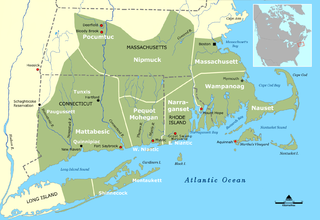
The Niantic are a tribe of Algonquian-speaking American Indians who lived in the area of Connecticut and Rhode Island during the early colonial period. They were divided into eastern and western groups due to intrusions by the more numerous and powerful Pequots. The Western Niantics were subject to the Pequots and lived just east of the mouth of the Connecticut River, while the Eastern Niantics became very close allies to the Narragansetts. It is likely that the name Nantucket is derived from the tribe's endonym, Nehantucket.

John Mason was an English-born settler, soldier, commander and Deputy Governor of the Connecticut Colony. Mason was best known for leading a group of Puritan settlers and Indian allies on a combined attack on a Pequot Fort in an event known as the Mystic Massacre. The destruction and loss of life he oversaw effectively ended the hegemony of the Pequot tribe in southeast Connecticut.

The Eastern Pequot Tribal Nation is an American Indian tribe in southeastern Connecticut descended from the Pequot people who dominated southeastern New England in the seventeenth century. It is one of five tribes recognized by the state of Connecticut.
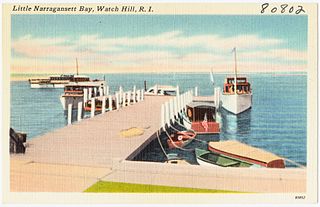
Little Narragansett Bay is an inlet of the Atlantic Ocean and an estuary of the Pawcatuck River on the Rhode Island–Connecticut state line. It is sheltered by the curving peninsula of Napatree Point.

The Montaukett ("Metoac"), more commonly known as Montauk are an Algonquian-speaking Native American people from the eastern and central sections of Long Island, New York.
Canonchet was a Narragansett Sachem and leader of Native American troops during the Great Swamp Fight and King Philip's War. He was a son of Miantonomo.
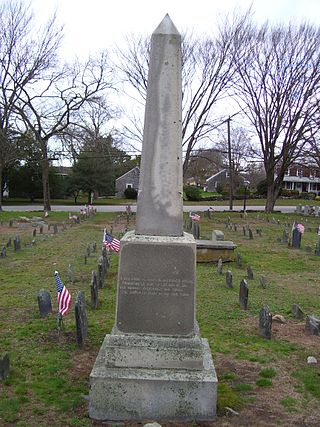
Elizabeth Pabodie, also known as Elizabeth Alden Pabodie or Elizabeth Peabody, was the first white child born in New England.

Narragansett is an Algonquian language formerly spoken in most of what is today Rhode Island by the Narragansett people. It was closely related to the other Algonquian languages of southern New England like Massachusett and Mohegan-Pequot. The earliest study of the language in English was by Roger Williams, founder of the Rhode Island colony, in his book A Key Into the Language of America (1643).
Tobias Saunders was a Deputy to the Rhode Island General Assembly, a Conservator of the Peace and a founding settler of Westerly, Rhode Island.
Reverend Ichabod Wiswall (1637–1700) was the third pastor of the church in Duxbury, Plymouth Colony, British America. Though he is thought to have given the first known funeral sermon in British America at the burial of Capt. Jonathan Alden in 1697, American funeral sermons predate this event by several decades.

The Narragansett Trail is a 16-mile hiking trail located in Connecticut and is one of the Blue-Blazed Trails maintained by the Connecticut Forest and Park Association, the Narragansett Council, and The Rhode Island chapter of Scouts BSA.
Rev. James Fitch was instrumental in the founding of Norwich and Lebanon, Connecticut. He was the first minister ordained in Saybrook, Connecticut and played a key role in negotiations with the Mohegans during King Philip's War.
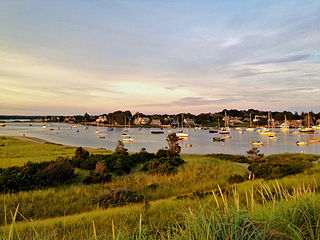
Harman Garrett was a Niantic sachem and then governor of the Eastern Pequots slightly east of the Pawcatuck River in what is now Westerly, Rhode Island. His chosen English name was very similar to that of Herman Garrett, a prominent colonial gunsmith from Massachusetts in the 1650s.
References
- ↑ Loitsyanskaya, M. S.; Elisashvili, V. I.; Shataeva, L. K. (1 May 1975). "History of the Church / About Us". www.congregationalchurchofnorthstonington.org. Retrieved 16 May 2017.
- ↑ "Reverend Joseph Fish In Colonial America". historyrocket. Retrieved 16 August 2017.
- ↑ "Reverend Joseph Fish In Colonial America". historyrocket. Retrieved 16 August 2017.
- ↑ Moffat, Roger. "Rev. Joseph Fish b. 28 January 1705/6 Duxbury, MA d. 26 May 1781 North Stonington, CT: WMGS Online Trees". trees.wmgs.org. Retrieved 12 May 2017.
- ↑ "Daniel, Charles". collections.dartmouth.edu. Retrieved 12 May 2017.
- ↑ Hubbell, Stephen (1 January 1863). "A discourse commemorative of Rev. Joseph Fish, for fifty years (from 1732-1781) pastor of the Congregational Church in North Stonington, Conn.: delivered at that place, Lord's day, August 16th, 1863". Bulletin job Office. Retrieved 12 May 2017.
- ↑ "The Eastern Pequot Journals of the Reverend Joseph Fish". Op-Ed. Yale Campus Press. 14 September 2015. Retrieved 11 May 2017.
- ↑ "Yale Indian Papers Search Results". findit.library.yale.edu. Retrieved 12 May 2017.
- ↑ "Apes, Samuel, - 1773 | Yale Indian Papers Project". yipp.yale.edu. Retrieved 12 May 2017.
- ↑ Glaza, Tobias (14 September 2015). "The Eastern Pequot Journals of the Reverend Joseph Fish". Op-Ed. Retrieved 12 May 2017.
- ↑ "Mixed Race Studies » New England". www.mixedracestudies.org. Retrieved 12 May 2017.
- ↑ Jones, Rhett S. (1989). "Article 4". Trotter Review. 3 (1).
- ↑ "Mixed Race Studies » New England". www.mixedracestudies.org. Retrieved 12 May 2017.